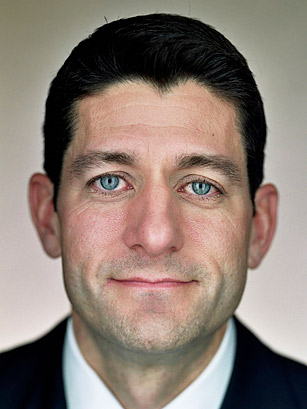
Here's a curious fact: in a year of political gridlock, when Congress could get nothing done — not even pass a budget — the most influential American politician was House Budget Committee chairman Paul Ryan. Through a combination of hard work, good timing and possibly suicidal guts, the Wisconsin Republican managed to harness his party to a dramatic plan for dealing with America's rapidly rising public debt. He brought an ugly issue out of the foggy realm of think tanks and blue-ribbon panels and dropped it into the middle of the national debate in time to define the next presidential election. If 2012 turns out to be a clear choice between very different answers to a genuinely important question — instead of the usual vague contest between competing slogans and haircuts — give the credit to Ryan.
The supply-sider from Janesville, Wis., tapped into a deep well of anxiety over trillion-dollar deficits at home and the threat of debt-fueled calamity in Europe. Did he deliver a perfect plan? Not even he claims that. But Ryan, 41, offered a budget that began to convey the scale of change necessary to defuse the American debt bomb: Sweeping tax reform. Unprecedented spending freezes. Most important, a thorough reinvention of federal entitlements.
You could see Washington wince. Plenty of Republicans were miserable about finding themselves steered into casting votes in favor of means-testing Social Security and converting Medicare to a voucher-like program. Democrats howled at the sacrilege and Ryan's refusal to raise income tax rates on the wealthy. Then they realized with delight that Ryan had restored them to their favorite turf: defending Granny from the supposedly heartless GOP. No wonder Republican Newt Gingrich, who touched the third rail of entitlement reform back in 1996 and has the scars to prove it, denounced Ryan's proposal as "right-wing social engineering."
But it was Ryan who watched with satisfaction as his fellow Republicans forced Gingrich to eat his words, and it was Ryan who counted the votes as his party overwhelmingly endorsed the tough budget in both the House and Senate. It was Ryan who brought President Obama down from his cloud of happy talk about windmills and high-speed trains to acknowledge that America has a plateful of peas to choke down after its binge at the dessert bar.
Ryan's success in setting the agenda was a long time coming. The Ryans of Janesville are a prominent family that has made piles of money moving mountains of dirt. Ryan's great-grandfather Patrick started a railroad-grading business with a team of mules in 1884. Today, Ryan Inc. Central is one of the largest earthmoving firms in the country, building everything from home sites to golf courses to landfills to wetlands. Young Paul worked briefly for the family firm in the marketing department, but it was clear from an early age that his real interest was political economics. Steeped in the fiscal conservatism common to business owners, he took his Miami of Ohio economics and political-science degree and moved to Washington.
He soon found himself writing speeches for the cheerful champion of low taxes and free markets, the late Jack Kemp of Buffalo, N.Y. As part of the policy staff at Empower America, an advocacy group founded by Kemp and William Bennett, Ryan worked with Peter Wehner, an official in George W. Bush's Administration. Wehner remembers Ryan as "a remarkable talent — extremely bright, intellectually curious and honest, with a huge appetite for economic data and economic theory. He read everything, digested everything and was able to convert it into language that the rest of us could understand." Wehner admired the fact that Ryan would do menial jobs without complaining — even scissoring newspaper articles for his technophobic bosses well into the Internet age.